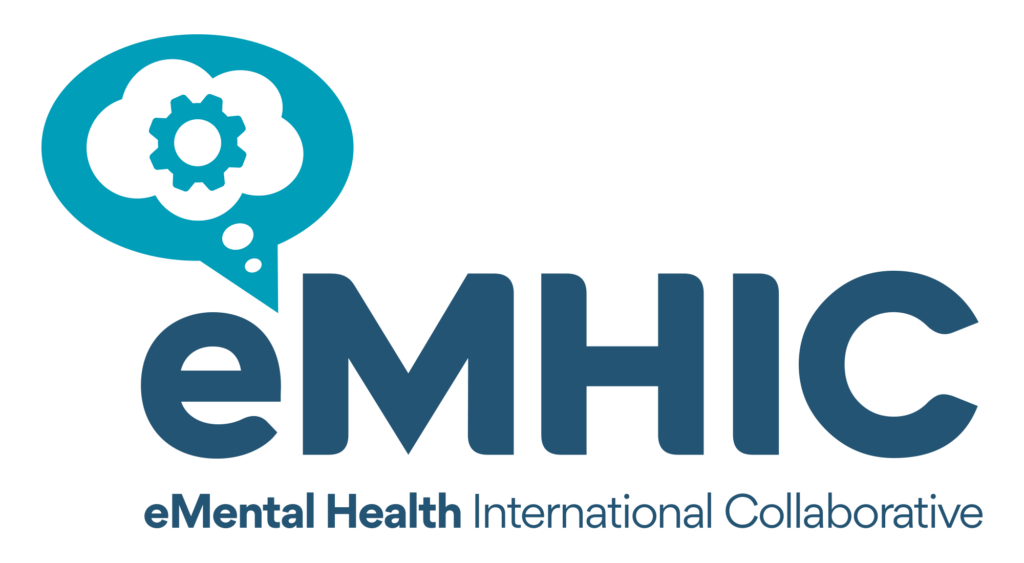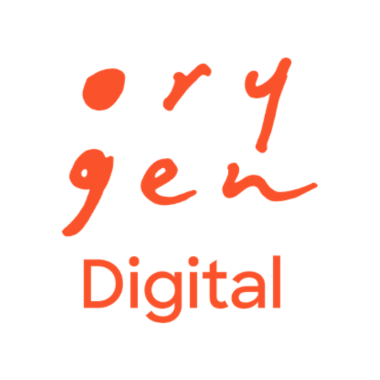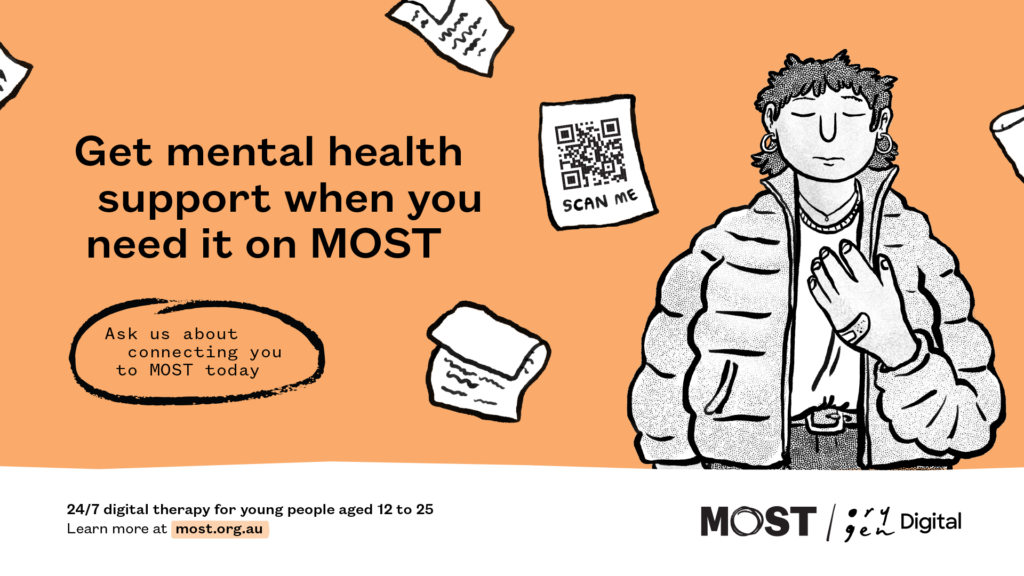A world-first digital therapy platform that supports youth mental health is proving its value and effectiveness to a growing number of clinicians and young Australians
COVID-19 forced health authorities to investigate how to deliver healthcare, including mental health care, differently. To help struggling health services meet public demand, the uptake of digital healthcare was fast tracked and, in the process, the potential of innovative digital mental health interventions that could deliver evidence-based treatment was highlighted.
One such intervention is MOST (formerly Moderated Online Social Therapy). This free digital mental health service for young Australians aged 12 to 25 provides access to self-directed therapeutic content, a safe moderated online community, peer workers, careers counselling and one-on-one clinical support.
Designed to work alongside face-to-face care and to also augment services before, during and after care, MOST is backed by 13 years of research and development by Orygen Digital, the technology division of Orygen, Australia’s centre of excellence in youth mental health.
The extent of youth mental illness
Globally, mental illness is the chronic disease of youth. In Australia, one in four young people experience mental illness, making it the leading cause of disability and death for this age group. According to the Australian Institute of Health and Welfare, in 2019-2020, young people aged 12-24 made up 22 per cent of all people receiving government subsidised services specific to mental health. They accounted for 20 per cent of people receiving services from psychiatrists, 22 per cent of people receiving service from GPs, and 23 per cent of people receiving services from clinical psychologists. Young Australians aged 12-24 also made up a quarter of all mental health related Emergency Department presentations.
Timing is everything
“Getting access to the right kind of support at the right time is vital in ensuring young people can take steps to improve their mental health and wellbeing. But getting that support quickly can be challenging in an environment of increased demand, long waitlists and other barriers to accessing care,” says Professor Mario Alvarez-Jimenez, Chief of Orygen Digital and MOST creator.
The pandemic exacerbated long waitlists for mental health care at a time when young people have been impacted by social isolation, lockdowns, remote learning and the loss of jobs and social contact.
In this context, and with funding from the Victorian State Government’s 2020 COVID-19 response package, MOST was rapidly translated from research to clinical practice. It is estimated that 86 per cent of research stagnates and does not reach the clinic, so this transition to the clinic has been a significant step.
It has enabled MOST to provide an alternative to the standard mental health service delivery model and showcases its tremendous potential to augment existing models of care. MOST can be part of a blended care approach used by young people with their clinician. In addition, it can deliver standalone support to young people while they wait to see a mental health clinician and after their discharge from a face-to-face service.
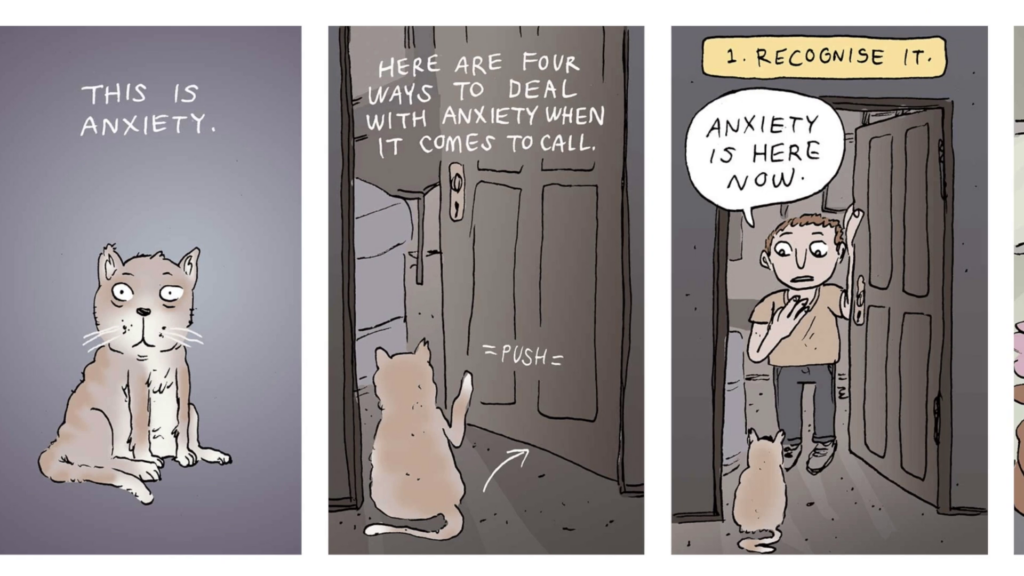
MOST – the picture today
Currently:
- In addition to the state of Victoria, MOST has been rolled out across two more Australian states (New South Wales and Queensland in early 2022) and the Australian Capital Territory (early 2023).
- more than 7,000 young people have been onboarded nationally through 242 participating youth mental health services (65 generalist and 177 specialist services).
- 94 per cent of young people who are using MOST are connecting with a clinician or peer worker.
- the most popular therapy content is focused on anxiety (40 per cent), depression (32 per cent), social skills (14 per cent) and social confidence (11 per cent).
- at 12 weeks, 95 per cent of young people surveyed would recommend MOST to another young person experiencing difficulties.
- 90 per cent of young people surveyed said they felt better at 12 weeks, and
- 50 per cent of young people surveyed said they felt more socially connected at 12 weeks.
To date, service rollout responses have consistently reflected the results of previous MOST trials, including the Horyzons randomized control trial based on the MOST model, and illustrate that MOST is effectively addressing gaps in existing care models for young people and is helping to ensure they get the right support at all stages of their mental health journey.
Additional research into the cost-effectiveness of online, mobile, and social media interventions has just been published by Orygen Digital and demonstrates digital mental health interventions can be a cost-effective and promising ongoing treatment approach for young people experiencing mental ill-health. The study evaluated the cost-effectiveness of Horyzons from a healthcare sector and a societal perspective in comparison with treatment as usual over 18 months. Assessing change in social functioning plus a cost-utility analysis, the research found Horyzons resulted in better social functioning and had significantly lower costs compared with treatment as usual from both the healthcare sector (AU$4789.59 per person on average) and a societal perspective (AU$5131.14 per person on average).
The cost-effectiveness and efficacy of MOST in clinical settings is now the focus of a AU$1.5m grant through the National Health and Medical Research Council’s Partnerships Projects.
Gaining confidence and trust
As one of the only youth digital mental health services in Australia that partners with face-to-face services, it has also been essential to develop strong collaborations with those services to work towards digitally augmenting treatment as usual.
Recommendation 60 of Australia’s 2021 Royal Commission into Victoria’s Mental Health System final report mandated a contemporary ‘system enabled by digital technology’ to ‘improve accessibility and continuity of care’ and MOST is at the forefront of this transformation. An important facet of MOST’s success is gaining the confidence of young people and meeting them on their terms. The recent BRACE project, led by Orygen Digital researchers Drs Imogen Bell and Jennifer Nicholas, examined the effect of COVID-19 on the mental health and wellbeing of young Australians, the impact on primary mental health service delivery, and the potential role of technology in supporting youth mental health. It found the majority of young people believed telehealth had a positive impact on mental health service quality and they felt safe, supported and respected when using it. They also said mental health care via telehealth was accessible, relevant, efficient and coordinated.
The majority of clinicians also felt they could perform their clinical duties remotely and BRACE found 65 per cent of clinicians were highly interested in continuing to provide mental health care to young people via telehealth in the future.
“Our youth mental health services are struggling and digitally enhancing services by integrating digital interventions can help relieve the pressure. Technology is already a seamless part of many services in our lives, like banking, and it provides timeliness, convenience and improved access. Mental health support should be no different,” says Dr Nicholas.
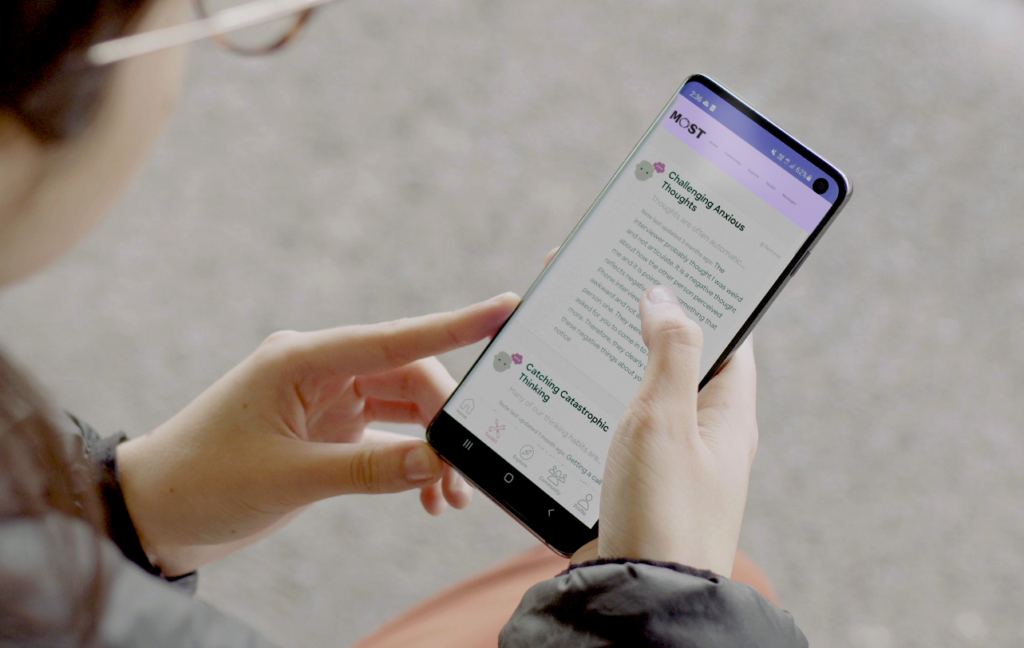
Winning recognition
MOST has garnered recognition for its impacts so far. In 2022, MOST received a ConnectingUP/InfoXchange not-for-profit technology innovator of the year award.
In 2021, the digital platform won the Mental Health Service award for excellence, innovation and best practice in therapeutic and clinical services. The award was presented by TheMHS, an international learning network for improving mental health services in Australia and New Zealand.
Recently, Professor Alvarez-Jimenez was also recognised with a Tom Trauer Evaluation and Research Award for his contribution to transforming youth mental health through digital technology including MOST and Orygen Digital’s virtual reality programs.
In late 2022, a major rebrand was applied to the MOST platform and supporting collateral, like the All About MOST video. It has helped visually connect MOST’s young users to a space they feel is safe, relevant, engaging and welcoming. Studio MASS, the agency that co-created the new brand, won a 2023 Better Future Australian Design Award (silver) for their work on MOST.
The future of MOST
Orygen Digital is focused on the continual improvement and evolution of MOST in order to increase the digital platform’s access, engagement and effectiveness. A MOST Android app was launched in March and the iOS app for Apple devices published on the App Store in June 2023. For now, these apps replicate the browser experience, but make accessing MOST easier and provide a foundation to introduce new digital features, functionality and an enhanced user experience as it continues to evolve.
Orygen Digital believes there is potential to expand the delivery of MOST to new settings, such as secondary schools, where the digital platform can directly reach the young people who can benefit from MOST’s high-quality mental health support.
“Digital interventions, like other digital products in our lives, are not complete – they adapt and evolve with changes in technology, but also with the needs of users. This can be incredibly powerful in mental health support if adequately resourced and funded,” says Professor Alvarez-Jimenez.
“Integrating MOST is changing the way we provide mental health care, and it is a first of its kind globally. By evaluating the economic, system and individual impacts of this new model of care, we create the evidence critical to achieving the 21st century mental health system that young people deserve.”
References
- https://finalreport.rcvmhs.vic.gov.au/recommendations/
